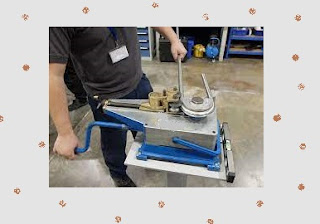Imported pipe bending machines have been of comparable quality and performance, and the technology behind them has progressed at an astonishing pace. Today the pipe bending machine business has to innovate constantly and make their equipment more competitive on the world stage right now. From precision cutting to advanced welding and assembly, the latest advancements in automation technology are revolutionizing the way pipes are bent, fabricated, and installed, making it possible to produce high-quality products faster, cheaper, and with greater precision than ever before.
The Original Initial Pipe Bending Operation
When starting out, there are a lot of tough
materials to bend, and using two straight pipe butts doesn't exactly showcase
the engineering operation's aesthetics or provide much support. Consequently,
the whole pipe ends up bending after the operation, and in the absence of a
suitable tool, people resort to using different lever principles to get the
pipe to bend.
The development of pipe bending machine tools
has been a boon to many pipe bending activities, thanks to the prevalence of
mechanical equipment in contemporary society and services. The first pipe
bending machine was a mechanical lever model that required human intervention.
With the wide application of pipe bending machines in several fields, this new
generation of pipe bending machines has even experienced this development. Many
pipe bending machine manufacturers, machines can increase efficiency, reduce
costs, and improve product quality. But with so many options on the market, it
can be overwhelming to choose the right one for your business.
What is Pipe Bending
Automation?
The practice of pipe bending has been an
essential component of the plumbing and pipeline industries for many years;
nevertheless, despite its significance, it is often a labor-intensive and
time-consuming procedure. The process of pipe bending has traditionally been
performed manually, and it has required trained workers to meticulously shape
and form pipes in accordance with certain standards. On the other hand, the
process of pipe bending is experiencing a revolution as a result of the recent
development of automated technology.
Technology Advancements in Automated Pipe Bending:
1. CNC Control: The technology known as computer numerical control (CNC) has made it possible to exert exact control over the bending process, which has resulted in accurate bends and increase repeatability.
2. Integration of robots: The incorporation of robots into pipe bending machines allows the smooth handling of materials, loading, and unloading, which further enhances the possibilities of automation.
3. Simulation software. This software gives engineers the ability to digitally create and optimize bending sequences, which cuts down on the amount of time needed for setup and minimizes mistakes that occur during production.
Benefits of Automated Pipe Bending:
· It is possible to obtain considerable gains in both efficiency and accuracy via the use of automated pipe bending, which is one of the many advantages that can be gained from this process.
· On top of that, automated pipe bending makes it feasible to create intricate pipe arrangements and forms, which would be very challenging or even impossible to do by hand.
· Pipes are created with accurate measures, angles, and finishes thanks to automation, which is essential in sectors such as oil and gas, where pipes must satisfy severe criteria to guarantee safe and efficient operation. Automation ensures that pipes are manufactured and manufactured with precision.
Bottom Line
As
we look to the future, it is anticipated that pipe bending will become even
more interrelated with other businesses, such as the manufacturing and
construction sectors. This will result in the creation of new and cutting-edge
approaches to the problem of pipe bending.
It
is now well acknowledged that automation has become an essential component of
contemporary pipe bending procedures. This is due to the multiple advantages it
provides, including higher productivity, better precision, and improved qualitycontrol. The industrial environment is always shifting, and businesses who
embrace automation in their operations are in a better position to maintain
their competitive edge and fulfil the needs of this landscape.



